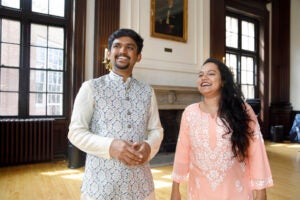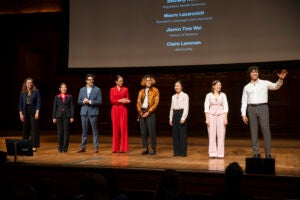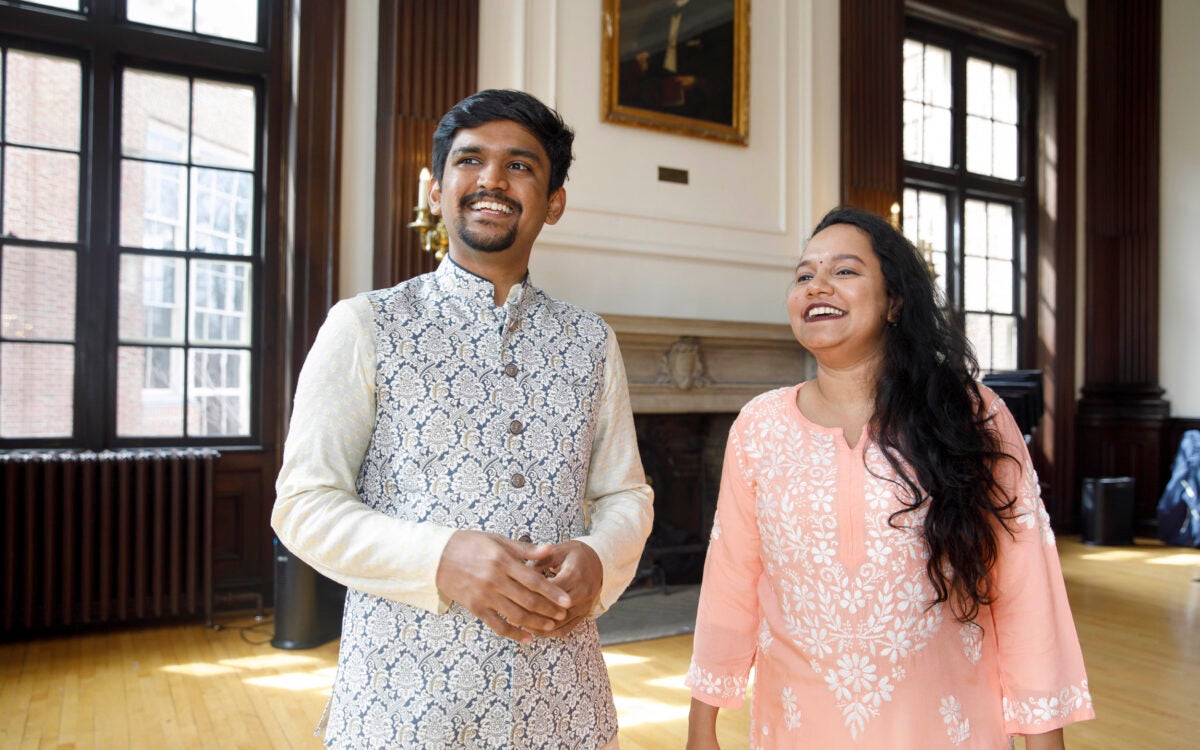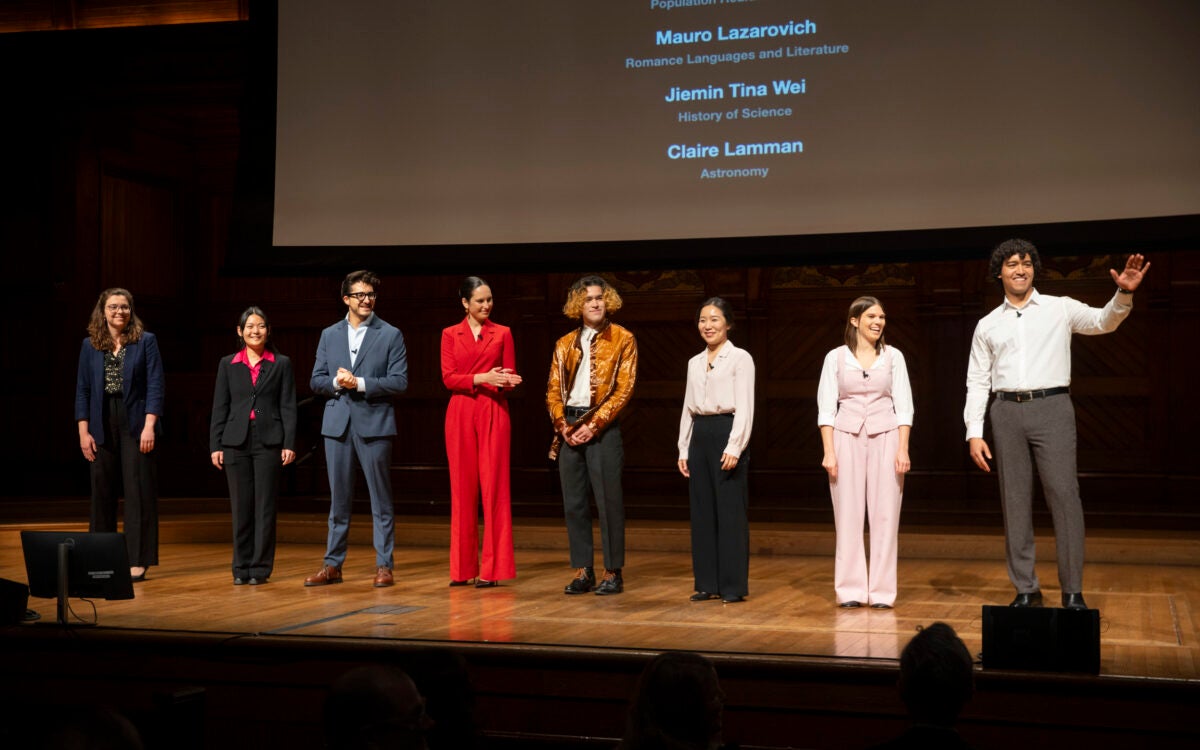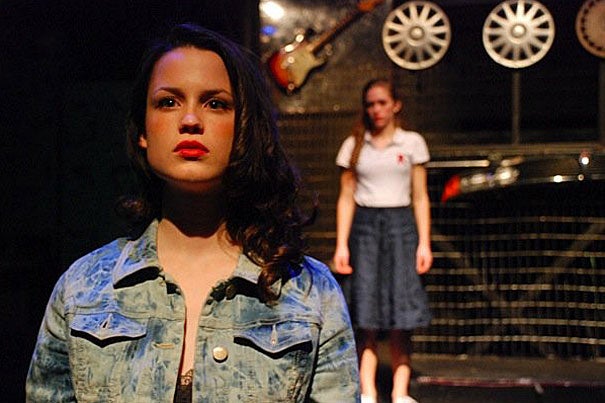
“You don’t have paid internships in the arts, so the opportunity to work with an experimental theater in London — and to see 32 plays — was more than I could have asked for when I was making my summer plans,” said Isabel Carey ’12, who had an internship at London’s Gate Theatre.
Photo courtesy of Isabel Carey
Summer in the city — or beyond
Curious Harvard undergrads tackle a range of experiences
Although Isabel Carey ’12 studies the history of science, she also has a passion for theater. While at Harvard, the Leverett House resident has been heavily involved in student shows, both as a designer and a performer. When Carey learned about a paid summer fellowship at London’s Gate Theatre, she applied. A few months later, she was on her way to the U.K.
“You don’t have paid internships in the arts,” she said, “so the opportunity to work with an experimental theater in London — and to see 32 plays — was more than I could have asked for when I was making my summer plans.”
For Carey and many of her classmates, learning continues after the school year ends. And the winter is the time when many summer program applications come due.
Around 80 percent of U.S. undergraduates surveyed said experiences outside the classroom setting are the most memorable of their college years, according to research by Harvard Graduate School of Education’s Richard Light, the Walter H. Gale Professor of Education. Although there’s much to be gained from traditional work and internship experiences, many students use summers to explore areas not necessarily related to concentration or career plans.
“Experience in the arts and athletics, as well as internships, work, and travel, all help students learn what they’re good at, and what matters to them,” said Robin Mount, director of career, research, and international opportunities at Harvard’s Office of Career Services (OCS). “It’s a little bit of a paradox. But when students broaden their horizons, it helps them to sharpen their focus.”
Because Carey attends college in the area where she grew up, she’s also eager to travel and discover what it’s like to live and work in another country. In addition to her London theater experience, Carey also spent a summer in Lima, Peru, working at the Museo de Arte on a grant from the David Rockefeller Center for Latin American Studies (DRCLAS). “The Rockefeller grants make it easy to explore,” she said. “They create great experiences for you.”
Of course, Harvard undergraduates are also passionate about their concentrations. Many welcome the chance to extend their studies beyond the boundaries of the academic year. Francesca Reindel ’11 loves neurobiology, so she took a fellowship at Harvard’s Program for Research in Science and Engineering (PRISE), created in 2005 “to significantly enhance the summer undergraduate scientific research experience.” She was happy to stay on campus and spend warm summer days in a lab, particularly because she got to meet with fellow PRISE participants in the evenings and talk science over dinner.
“PRISE was critical to my science education,” she said. “It put me in touch with scientists across disciplines and allowed me to learn in depth about projects in physics and chemistry.”
After PRISE, Reindel went on to create the Science Cabinet, a group of students, faculty, and administrators who “foster a more cohesive scientific community” at Harvard. OCS’s Mount said the group is an example of how a summer experience can carry over to the school year.
“Students leverage their summer experience for what they do during the semester,” she said. “They create new activities, groups, and events, bringing knowledge from one setting into the next. It’s holistic.”
During his sophomore year, Romeo Alexander ’11, a mathematics concentrator, decided to pursue his interest in language study and spend the summer in Ishikawa, Japan, as a participant in the Princeton Japanese language program. During his junior year, he had his sights set on an internship in New York City, but, encouraged by his mother to broaden his horizons, accepted a spot instead at Deutsche Bank in Tokyo. This June, Alexander will get his wish to work in Manhattan — as an analyst of Japanese institutional equities for Morgan Stanley.
“My sophomore year, I was worried I wouldn’t get funding to study Japanese,” he said, “but there are lots of different sources at Harvard. Then it was a bank in Tokyo after junior year. I met people from different universities, not just Harvard and Yale. Now there’s a whole network of people I know inside and outside of banking who I met in Japan.”
While there are a score of opportunities for travel, internships, and study, about 40 percent of undergraduates choose “none of the above” and go home for the summer. Nancy Saunders, associate director of Undergraduate Career Programming and Advising at OCS, said one of the most important things a student can do when the school year ends is to rest and restore in preparation for another academic year.
“We emphasize that it’s not a necessity to strike out on your own and do something international,” she said. “A lot of students need to reconnect with family and friends. Freshman year, in particular, is really tough. It’s important to take a break.”
Katie Coulson ’11 had no regrets about spending the summer at home in College Station, Texas, after her freshman year. The chemistry concentrator said the time off allowed her to come back to Cambridge refreshed.
“Relaxing and recharging with my family was really important for me,” she said. “I’ve never done anything related to chemistry over the summer. That’s why I still love it. If I’d spent the summer in a lab, I might have felt jaded or frustrated.”
Though the temperatures are now freezing and the days are short, Mount said interested undergraduates should begin planning for summer now. Many funders and on-campus employers have January and February deadlines for summer opportunities. Jobs or internships in government may also require lengthy security clearance. It’s best to get applications out of the way before the spring term starts and course work piles up.
“As the semester progresses, students get too busy with their course work to be able to spend time on applications and interviews,” she said. “Our motto is what your grandmother said: ‘The early bird gets the worm!’ ”

